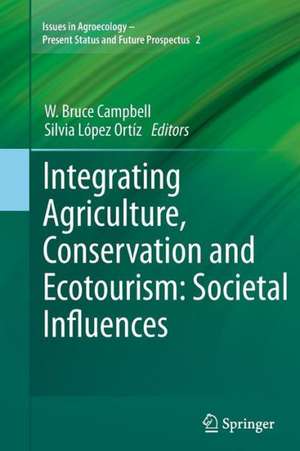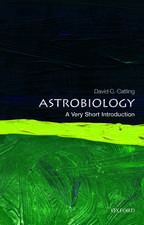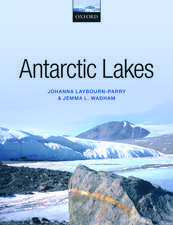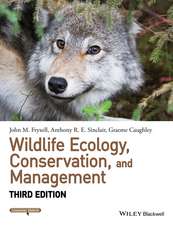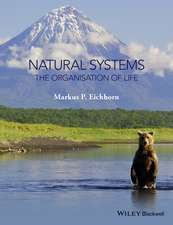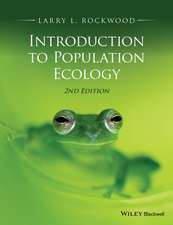Integrating Agriculture, Conservation and Ecotourism: Societal Influences: Issues in Agroecology – Present Status and Future Prospectus, cartea 2
Editat de W. Bruce Campbell, Silvia López Ortízen Limba Engleză Paperback – 18 iul 2014
| Toate formatele și edițiile | Preț | Express |
|---|---|---|
| Paperback (2) | 945.79 lei 43-57 zile | |
| SPRINGER NETHERLANDS – 3 aug 2013 | 945.79 lei 43-57 zile | |
| SPRINGER NETHERLANDS – 18 iul 2014 | 1217.10 lei 43-57 zile | |
| Hardback (2) | 951.29 lei 43-57 zile | |
| SPRINGER NETHERLANDS – 9 iun 2011 | 951.29 lei 43-57 zile | |
| SPRINGER NETHERLANDS – 24 iun 2012 | 1223.11 lei 43-57 zile |
Preț: 1217.10 lei
Preț vechi: 1484.27 lei
-18% Nou
Puncte Express: 1826
Preț estimativ în valută:
232.91€ • 241.69$ • 194.68£
232.91€ • 241.69$ • 194.68£
Carte tipărită la comandă
Livrare economică 17-31 martie
Preluare comenzi: 021 569.72.76
Specificații
ISBN-13: 9789400794641
ISBN-10: 9400794649
Pagini: 300
Ilustrații: XX, 280 p.
Dimensiuni: 155 x 235 x 16 mm
Greutate: 0.43 kg
Ediția:2012
Editura: SPRINGER NETHERLANDS
Colecția Springer
Seria Issues in Agroecology – Present Status and Future Prospectus
Locul publicării:Dordrecht, Netherlands
ISBN-10: 9400794649
Pagini: 300
Ilustrații: XX, 280 p.
Dimensiuni: 155 x 235 x 16 mm
Greutate: 0.43 kg
Ediția:2012
Editura: SPRINGER NETHERLANDS
Colecția Springer
Seria Issues in Agroecology – Present Status and Future Prospectus
Locul publicării:Dordrecht, Netherlands
Public țintă
GraduateCuprins
Foreword.- Acknowledgements.- List of Contributors and Biosketches of Editors and Authors.- Future Visions for Experiential Education in the Agroecology Learning Landscape.- International Shifts in Agricultural Debates and Practice: An Historical View of Analyses of Global Agriculture.- Sustainability Standards and Their Implications for Agroecology.- Water Sustainability and Politics – Examples from Latin America and Implications for Agroecology.
Textul de pe ultima copertă
Issues In Agroecology approaches this complex panorama of interrelated topics by presenting authoritative, comprehensive, and analytical reviews by leading scientists in all areas of agroecology worldwide. Authors for each review are invited and represent a collaborative mix sufficient to provide strong summaries and scholarly advances that serve as foundations for discussion leading to novel routes of research activity, application of management methodologies, and education and outreach programs. Each review represents concise and up-to-date syntheses of the rapidly growing quantity of scientific information in each chosen topic within this highly interdisciplinary field. The authors for each review assess the present status of this knowledge as to whether or not it is effectively moving toward or contributing to increased sustainability. As a part of this assessment, the authors identify inadequacies, errors, and gaps in knowledge that may be hindering or opposing sustainability objectives. For each review, the authors ultimately discuss what might be needed to bring work and programs onto a better track towards achieving sustainability. Such informed assessments of the routes to realize future potential make the series an essential part of the scientific method and a necessity for researchers, teachers, students, and field professionals when dealing with increasing global environmental and socioeconomic change. This format will make Issues in Ecology a highly citable series that is guaranteed to enlighten research teams, technology users, educators, students, and the general public on the status and advances of agroecology around the world.
Caracteristici
Provides concise reviews of current important and complex issues in agroecology Assesses the present status of knowledge of the issue with regard to effectively moving toward improving sustainability Identifies inadequacies, errors, and gaps in knowledge that may hinder or oppose effective progress toward improving sustainability Discusses what, if possible, is needed to bring the issue onto a better track toward sustainability objectives
Recenzii
From the reviews:
“This book explores the new frontier of agroecology, the fluid intersection of environment and agriculture. It is the first of an interdisciplinary multivolume series that covers the future of agriculture, the related fields of ecotourism and conservation, sustainability and environmental issues, and more. … Summing Up: Recommended. Upper-division undergraduates through professionals/practitioners.” (M. J. Stone, Choice, Vol. 49 (8), April, 2012)
“This book explores the new frontier of agroecology, the fluid intersection of environment and agriculture. It is the first of an interdisciplinary multivolume series that covers the future of agriculture, the related fields of ecotourism and conservation, sustainability and environmental issues, and more. … Summing Up: Recommended. Upper-division undergraduates through professionals/practitioners.” (M. J. Stone, Choice, Vol. 49 (8), April, 2012)
Notă biografică
Issues In Agroecology integrates agriculture, ecology, sociology, anthropology, environmental sciences, ethics, economics, rural development, sustainability, policy and education. The series approaches this complex panorama of topics by presenting authoritative, comprehensive, and analytical reviews from leading scientists in all areas of agroecology worldwide. Authors are invited and represent a collaborative mix to provide strong summaries and scholarly advances that serve as foundations for discussion leading to novel routes of research activity, application of management methodologies, and education and outreach programs. Each review is a concise and up-to-date synthesis of the rapidly growing quantity of scientific information within this highly interdisciplinary field. The authors for each review assess the present status of the knowledge as to whether or not it is effectively contributing to increased sustainability. As a part of this assessment, the authors identify inadequacies, errors, and gaps in knowledge that may be hindering or opposing sustainability objectives. For each review, the authors ultimately discuss what might be needed to bring work and programs onto a better track towards achieving sustainability. Such informed assessments of the routes to realize future potential go beyond the individual farm to include landscapes, communities, and biogeographic regions by emphasizing their unique agricultural and ecological values, and their biological, societal, and cultural components and processes. As a result of these efforts, this series is an essential part of the scientific method and a necessity for researchers, teachers, students, and field professionals when dealing with increasing global environmental and socioeconomic change. Issues In Agroecology is a highly citable series that is guaranteed to enlighten research teams, technology users, educators, students, and a general academic audience on the status and advances of agroecology worldwide.ody>
